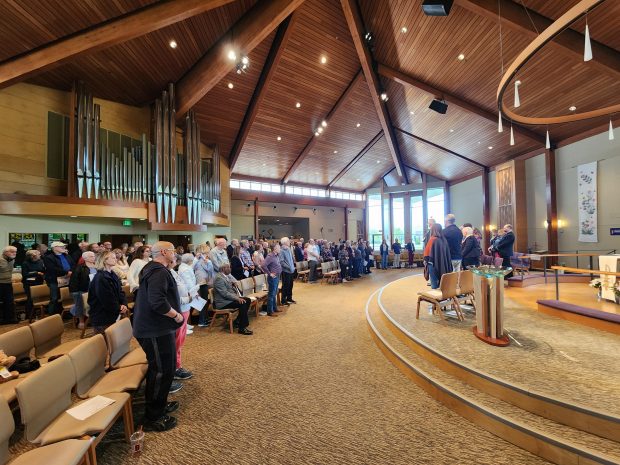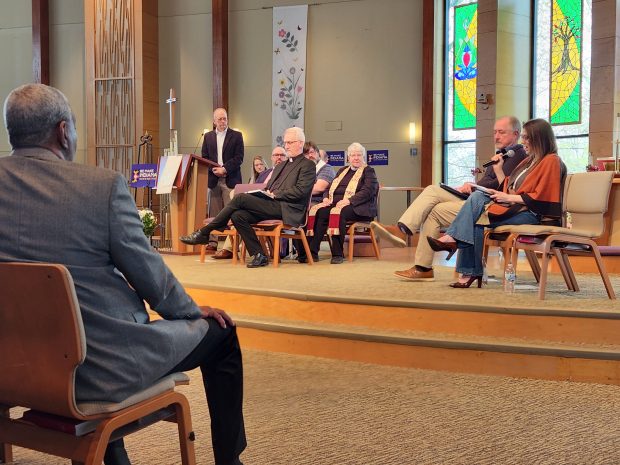In a sanctuary full of supporters Saturday afternoon, a consortium of faith leaders secured public promises from city and government officials from Valparaiso to take concrete steps to solve the city’s affordable housing problem.
The Porter County Chapter of We Make Indiana nearly filled the pews at Christ Lutheran Church. Attendees listened to local statistics and testimonials and then heard from Valparaiso City Administrator Bill Oeding, as well as remarks from Valparaiso City Council President Ellen Kapitan, D-At-large, and Council Members Robert Cotton, D-2nd, and Emilie Hunt, D-At-large.
It was the second public event held by We Make Indiana, which aims to bring people of faith and conscience together with public officials to make communities safe, healthy, and whole. A variety of pastors set the tone with opening remarks and Greg Arthur of Duneland Community Church in Chesterton did so with excerpts from Jeremiah 29 which tells the faithful to “build houses and settle down.”
With historically low housing inventory, high interest rates and skyrocketing inflation, that’s no easy order at any economic strata but the shelter landscape for the working class is particularly hostile in Valparaiso, participants reported. Sonia Fabbri, of Duneland Community Church, said the average two-bedroom apartment rents for $1200 per month in the state of Indiana.
To afford that within standard budgeting guidelines she said a person would need to earn $22 per hour, but the average Indiana renter earns $18 per hour. “Quite a gap,” she said, before adding that the average renter in Valparaiso pays up to $900 more per month than that state average.
Social worker Serena Fugate shared her own housing struggles as an example. The single mother said she’s lived in Valparaiso for 30 years, some of which were spent homeless when her son was a toddler. “Yes, we had a place to sleep, but it varied by the day,” she said. “I carried so much shame around with me.”
She said they lived in hotels for years while she struggled to save enough for the first and last months’ rent plus a security deposit. When she finally got them into housing she struggled to keep them there and often went to bed hungry.
“Throughout my son’s life I always worked two jobs, but I still could not provide for our needs,” Fugate said. She said a 700-square-foot apartment that was $635 in the 2010s now rents for $1100 per month.
“I still struggle,” she said of her current rent of $1400 per month. “I did everything that I was told would get me out of poverty – went to school, worked two jobs always, got a master’s – and still can’t afford housing in Valpo.”
Grandmother Mary Michna, a 78-year-old member of Christ Lutheran Church, said that come August, she’ll have been on a waiting list for affordable senior housing for three years. “Aging in place is a great thing if you can afford it,” she said, “but some will need to downsize.”
She spoke of a fellow senior who sleeps in the living room of his two-story home because he can’t get to the second-level bedrooms and can’t afford to move.

Their stories are all too familiar to Center Township Trustee Jesse Harper who said, “Above and beyond, more of what we provide is assistance with housing.” On Wednesday he said he had a chronically unhoused person in one room of his office and a couple being evicted after a conglomerate bought out their apartment complex and raised the rents in another.
“Oftentimes, we will see 10 people in our office in a day, 15 people in our office in a day, and we might make one win,” Harper said, stressing that if the systemic problem isn’t fixed trustees like him will just “continue triaging.”
To that end, “Things are starting to change,” said Valparaiso City Administrator Bill Oeding, who said he himself struggled to get a mortgage when he moved here in 1980. “I can tell you, dollar for dollar, what it costs to build a house and it’s not cheap. Some of it is government-related.”
Several speakers mentioned House Bill 1005 which can provide municipalities funding to support housing infrastructure, such as utility extensions. Municipalities can fast-track their place in the application process when adopting certain zoning requirements. Valparaiso City Council Vice President Emilie Hunt read a statement from Council President Ellen Kapitan in which she invited the public to the Your Home, Your City Symposium at City Hall from 5 to 8 p.m. on May 29.
For her own part, like Oeding, Hunt pledged to take actionable steps to solve the housing affordability issue in Valparaiso and meet with We Make Indiana within the next 30 days to help “those who can’t afford a $400,000 starter home. I’m grateful to be on a council that takes actionable steps.”
Councilman Robert Cotton also made the pledge. “If we allow the market to take care of housing we are on the trajectory to become a gated community without the need for gates,” he said.
Shelley Jones is a freelance reporter for the Post-Tribune.





